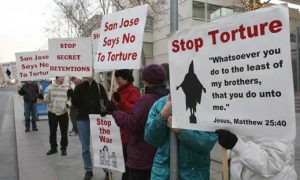Speaking of Faith’s Krista Tippett engages three generations of Evangelical leaders on the issue of faith and political action
This past April Speaking of Faith host Kirsta Tippett sat down with Charles Colson, Greg Boyd, and Shane Claiborne to discuss the shifting opinions of Evangelicals on the proper balance between Christian mission and political action. The diversity of opinions may come as a surprise to many who are unfamiliar with the emerging cadre of young evangelical leaders.
At this year’s National Pastor’s Convention held in San Diego, Kirsta Tippett, host of Speaking of Faith, a weekly radio program syndicated on many NPR stations in the US, moderated a discussion between three generations of Evangelical leaders. (Originally aired April 17, 2008) The entire discussion (MP3) as well as a transcript of the program and an unedited version of the conversation is available on the program’s website.
The conversation revolves around the issue of how Christians who take the Bible seriously ought to engage in public discourse and action. As the discussion progresses Tippett works to draw out an emerging difference between the position of Charles Colson and that of Shane Claiborne. Colson, who represents the older end of the baby boomer generation, argues that while Christians should not allow themselves to become the religious wing of any political party, Evangelicals are called to base their votes, values, and public actions on their religious convictions. On the other hand, Shane Claiborne, a Gen-X minister, suggests that translating biblical principles into political positions and candidate endorsements may not be so simple and argues for a firm distinction between Christian principles and electoral politics.
Tippet is a skilled moderator and draws both Colson and Claiborne further into dialogue, but it is the third member of the panel, Greg Boyd, 40 something mega-church pastor, who best articulates the frustrations that many moderate Christians feel as they try alternately to construct, demolish, and navigate boundaries between Christian and political commitments. With almost a sense of resignation he says, “I don’t think following Jesus gives us any special wisdom about how to fix government.” The conversation continues, but this statement is never rebutted and it opens even more questions.
All three panelists share personal stories that lend credence to their positions, and at the end of the discussion they affirm their common commitment to serving Christ and endeavoring to follow biblical principles, but there is no consensus on the issue of political action. Instead, the entire discussion has demonstrated the widening range of opinions among Evangelicals and the growing influence of Liberals in Evangelical circles.
In an election year when pundits use phrases like “the Evangelical vote” or speak of “Christian” as a demographic category, conversations like this one serve Christian moderates well. They help tell the truer and more nuanced story of Evangelicalism. They remind Christians to avoid the simple leap from Christian identity to political identification. And they call moderate Christians prayerfully and personally to engage the bible again and again, and not to lean on timeworn truisms that masquerade as biblical wisdom.
Charles Colson is a former Nixon Whitehouse advisor and Watergate conspirator, founder and chairman of Prison Fellowship Ministries, and author of Born Again and the recently released God and Government.
Greg Boyd is pastor of Woodland Hills Church in Minnesota and author of The Myth of a Christian Nation: How the Quest for Political Power is Destroying the Church.
Shane Claiborne is the founder of A Simple Way, a new monastic community in Philadelphia and author of Jesus for President: Politics for Ordinary Radicals.


